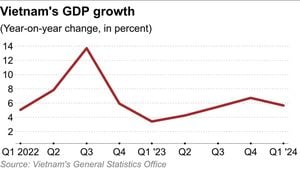A shark attacked 61-year-old Kenji Nonoka off the coast of Maui's Waiehu Beach Park on the morning of November 1, severing part of his leg. Surfers at the scene, who quickly jumped to help, witnessed the terrifying incident as Nonoka cried out for assistance after being bitten and bravely attempted to swim back to safety. Eyewitnesses described the frantic moments following the attack, with one witness, David Basques, recalling the chilling moment: "I looked, and all of a sudden, I just seen him splash, and I don’t know what was happening."
The shark bite occurred early Friday morning around 7:05 AM as Nonoka enjoyed the waves at the surf spot known as "Sand Piles." After emergency services were alerted, police officers were the first to arrive and applied multiple tourniquets to stem the bleeding before paramedics could take over. Maui Fire Assistant Chief Jeff Giessa emphasized the heroic efforts of those nearby, acknowledging the surfer's strength and composure as he struggled to make it back to shore. Ideally alert, he was taken to Maui Memorial Medical Center, where he underwent surgery.
His injuries were severe; the right leg had been bitten off just below the knee. Following the successful surgery, the current status of the victim remains uncertain, as hospital officials have not released additional details about his condition since the operation. Authorities, conducting inquiries about the incident, noted: "Whatever Good Samaritans offered assistance, I’d like to commend them as well," Giessa remarked. It was later reported through various sources, including Hawaii News Now, how the victim courageously swam half the distance to the shore before receiving help.
Following this traumatic occurrence, local officials wasted no time implementing safety measures, as the beach and the immediate waters were closed off to swimmers for investigation. The area has been cordoned off from Paukūkalo to Waihe'e, where additional shark warning signs have been placed, indicating the continued risks present.
State officials have ramped up ocean patrols utilizing rescue craft and drones to survey for any remaining shark activity, ensuring safety measures are adhered to. Local authorities are on high alert as the investigation continues, with the Department of Land and Natural Resources (DLNR) monitoring patterns to secure the safety of ocean-goers moving forward.
This incident is the latest reminder about the potential dangers of shark attacks, particularly for surfers. Just this past summer, Maui experienced heightened concerns stemming from aggressive fish behavior associated with the marine environment. Historically, Hawaii has shown varying shark activity levels, prompting advocates to encourage surfers and beachgoers to maintain vigilance.
Kenji's story, inspiring and tragic, has prompted fundraising initiatives for his medical expenses. A GoFundMe campaign titled "Support Kenji's Shark Attack Recovery" was established shortly after news broke of the attack, quickly reaching over $36,000 of its $100,000 goal. The campaign's description summarizes his character and resilience: "Kenji was attacked by a shark just below his knee. His good friends and regular morning crew helped him in, and he is currently recovering well in the ICU, but we all want to support Kenji as he continues to heal. "Even coming out of surgery, he sagely remarked, ‘I still love the ocean!’"
Such events resonate strongly within surf communities, amplifying calls for broader awareness about marine safety and the unpredictability of ocean interactions. Following Kenji's heroic actions and the subsequent support rallying around him, there lies the hopeful notion of recovery, community strength, and the enduring love surfers have for the ocean.



